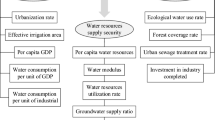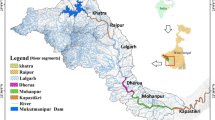Abstract
Reliability, resilience, and vulnerability (RRV) have been widely used as the performance criteria of a water supply system in the studies conducted over the last three decades. This study attempts to modify the traditional method commonly applied to estimate these criteria using fuzzy logic thereby the performance criteria of the points with the threshold and intermediate values are more accurately estimated. Traditional methods (RRV-Fixed) of estimating these criteria are based on the fixed threshold values to represent the functionality of a water supply system, using a binary system to identify the periods a system fails to supply the water demands. The employment of this binary system may be taken into account as a weakness of the evaluating system, especially when water portion met is close to the threshold values. The present study develops a new method named RRV-Fuzzy, to ameliorate the weaknesses of the traditional RRV-Fixed estimating system.The method is designated as “Fuzzy Performance Criteria” built upon the traditional RRV formulae with improvements made to their structures using fuzzy membership functions. The efficiency of the proposed method is verified via implementation on two case studies including a theoretical and a real-world water basin. A comparison of the proposed RRV-Fuzzy and the traditional RRV-Fixed methods confirms the efficiency of the proposed method with regard to the improvements achieved in the relevant estimations, validating the new approach to be quite effective and practicable.



Similar content being viewed by others
Explore related subjects
Discover the latest articles and news from researchers in related subjects, suggested using machine learning.Data Availability
Data will be made available on request.
References
Asefa T, Clayton J, Adams A, Anderson D (2014) Performance evaluation of a water resources system under varying climatic conditions: reliability, resilience, vulnerability and beyond. J Hydrol 508:53–65. https://doi.org/10.1016/j.jhydrol.2013.10.043
Ashofteh PS, Haddad OB, Akbari-Alashti H, Marino MA (2015) Determination of irrigation allocation policy under climate change by genetic programming. J Irrig Drain Eng 141(4):04014059. https://doi.org/10.1061/(ASCE)IR.1943-4774.0000807
Aydin NY (2014) Scenario-based sustainability assessment to provide interactive decision support for the Long-term transition of urban water supply systems, Dissertation, University of Kaiserslautern
El-Baroudy I, Simonovic SP (2003) New fuzzy performance indices for reliability analysis of water supply systems, Report No. 045, London, Ontario
El-Baroudy I, Simonovic SP (2006) Application of the fuzzy performance measures to the City of London water supply system. Can J Civ Eng 33(3):255–265. https://doi.org/10.1139/l05-113
Global Water Partnership (2003) ToolBox integrated water resources management GWP secretariat, Stockholm
Global Water Partnership TAC (2000) Integrated water resources management. TAC Background Paper No. 4. Global Water Partnership Technical Advisory Committee, Stockholm
Hashimoto T (1980) Robustness, reliability, resilience and vulnerability criteria for planning water resources systems, PhD Thesis, University Microfilms International, Ann Arbor, MI, USA
Hashimoto T, Stedinger JR, Loucks DP (1982) Reliability, resiliency, and vulnerability criteria for water resource system performance evaluation. Water Resour Res 18(1):14–20. https://doi.org/10.1029/WR018i001p00014
Hoque YM, Tripathi S, Hantush MM, Govindaraju RS (2012) Watershed reliability, resilience and vulnerability analysis under uncertainty using water quality data. J Environ Manag 109:101–112. https://doi.org/10.1016/j.jenvman.2012.05.010
International Union for Conservation of Nature, World Wildlife Fund (1980) World conservation strategy: living resource conservation for sustainable development. Gland, Switzerland: IUCN
Karamouz M, Mohammadpour P, Mahmoodzadeh D (2017) Assessment of sustainability in water supply-demand considering uncertainties. Water Resour Manag 31(12):3761–3778. https://doi.org/10.1007/s11269-017-1703-9
Klir G, Yuan B (1995) Fuzzy sets and fuzzy logic. Prentice hall, Upper Saddle River
Kumari S, Mujumdar PP (2017) Fuzzy set–based system performance evaluation of an irrigation reservoir system. J Irrig Drain Eng 143(5):04017002. https://doi.org/10.1061/(ASCE)IR.1943-4774.0001155
Li RJ, Lee ES (1991) An exponential membership function for fuzzy multiple objective linear programming. Comput Math Appl 22(12):55–60
Loucks DP (1997) Quantifying trends in system sustainability. Hydrol Sci J 42(4):513–530. https://doi.org/10.1080/02626669709492051
Loucks DP, Gladwell JS (1999) Sustainability criteria for water resource systems. Cambridge University Press
Mahmoud MS (2018) Fuzzy control, estimation and diagnosis. Springer International, Riyadh
Mashhadi Ali A, Shafiee ME, Berglund EZ (2017) Agent-based modeling to simulate the dynamics of urban water supply: climate, population growth, and water shortages. Sustain Cities Soc 420-434. https://doi.org/10.1016/j.scs.2016.10.001
Math Works (2020) <http://www.mathworks.com/help/fuzzy/gbellmf.html>
McMahon TA, Adeloye AJ, Zhou SL (2006) Understanding performance measures of reservoirs. J Hydrol 324(1–4):359–382. https://doi.org/10.1016/j.jhydrol.2005.09.030
Moy WS, Cohon JL, ReVelle CS (1986) A programming model for analysis of the reliability, resilience, and vulnerability of a water supply reservoir. Water Resour Res 22(4):489–498. https://doi.org/10.1029/WR022i004p00489
Murray-Rast H, Sally H, Salemi HR, Mamanpoush A (2000) An overview of the hydrology of the Zayandeh Rud Basin. IAERI-IWMI Research, Reports 3, Colombo, Sri Lanka
Ni X, Wu Y, Wu J, Lu J, Wilson PC (2012) Scenario analysis for sustainable development of Chongming Island: water resources sustainability. Sci Total Environ 439:129–135. https://doi.org/10.1016/j.scitotenv.2012.09.031
Pedrycz W, Gomide F (1998) An introduction to fuzzy sets: analysis and design. Mit Press, Cambridge
Recanati F, Castelletti A, Dotelli G, Melià P (2017) Trading off natural resources and rural livelihoods. A framework for sustainability assessment of small-scale food production in water limited regions. Adv Water Resour 110:484–493. https://doi.org/10.1016/j.advwatres.2017.04.024
Rehana S, Mujumdar PP (2012) Climate change induced risk in water quality control problems. J Hydrol 444:63–77. https://doi.org/10.1016/j.jhydrol.2012.03.042
Ren K, Huang S, Huang Q, Wang H, Leng G, Fang W, Li P (2020) Assessing the reliability, resilience and vulnerability of water supply system under multiple uncertain sources. J Clean Prod 252:119806. https://doi.org/10.1016/j.jclepro.2019.119806
Ross TJ (2009) Fuzzy logic with engineering applications. Wiley, West Sussex
Safavi HR, Golmohammadi MH, Sandoval-Solis S (2015) Expert knowledge based modeling for integrated water resources planning and management in the Zayandehrud River basin. J Hydrol 528:773–789. https://doi.org/10.1016/j.jhydrol.2015.07.014
Safavi HR, Golmohammadi MH, Sandoval-Solis S (2016) Scenario analysis for integrated water resources planning and management under uncertainty in the Zayandehrud river basin. J Hydrol 539:625–639. https://doi.org/10.1016/j.jhydrol.2016.05.073
Sandoval-Solis S, McKinney DC, Loucks DP (2011) Sustainability index for water resources planning and management. J Water Resour Plan Manag 137(5):381–390. https://doi.org/10.1061/(ASCE)WR.1943-5452.0000134
Sumathi S, Paneerselvam S (2010) Computational intelligence paradigms: theory and applications using MATLAB. CRC Press
Vieira J, Cunha MC, Luís R (2018) Integrated assessment of water reservoir systems performance with the implementation of ecological flows under varying climatic conditions. Water Resour Manag 32(15):5183–5205. https://doi.org/10.1007/s11269-018-2153-8
Vigerstol K (2002) Drought Management in Mexico’s Rio Bravo Basin. Master Thesis, University of Washington, Seattle, WA, USA
Wang Q, Zhan L (2019) Assessing the sustainability of renewable energy: an empirical analysis of selected 18 European countries. Sci Total Environ 692:529–545. https://doi.org/10.1016/j.scitotenv.2019.07.170
Wang Q, Li S, He G, Li R, Wang X (2018) Evaluating sustainability of water-energy-food (WEF) nexus using an improved matter-element extension model: a case study of China. J Clean Prod 202:1097–1106. https://doi.org/10.1016/j.jclepro.2018.08.213
Wang Q, Li S, Li R (2019) Evaluating water resource sustainability in Beijing, China: combining PSR model and matter-element extension method. J Clean Prod 206:171–179. https://doi.org/10.1016/j.jclepro.2018.09.057
WCED (World Commission on Environment and Development) (1987) Our common future. The Brundtland Report, Oxford University Press, Oxford
Wu D (2012) Twelve considerations in choosing between Gaussian and trapezoidal membership functions in interval type-2 fuzzy logic controllers. IEEE Int Conf Fuzzy Syst 20:832–848. https://doi.org/10.1109/FUZZ-IEEE.2012.6251210
Yazdandoost F, Moradian S, Izadi A (2020) Evaluation of water sustainability under a changing climate in Zarrineh River basin. Iran Water Resour Manag 34:1–16. https://doi.org/10.1007/s11269-020-02693-3
Zadeh LA (1997) Toward a theory of fuzzy information granulation and its centrality in human reasoning and fuzzy logic. Fuzzy Sets Syst 90(2):111–127. https://doi.org/10.1016/S0165-0114(97)00077-8
Zimmermann HJ (2001) Fuzzy control. In: Fuzzy set theory—and its applications. Springer, Dordrecht, pp 223–264
Acknowledgements
We would like to thank Dr. Farshad Rezaei for his very useful and constructive edits.
Author information
Authors and Affiliations
Contributions
Mohammad H. Golmohammadi: Conceptualization, Methodology, Supervision, Writing- Original draft preparation, Investigation. Hamid R. Safavi: Visualization, Methodology, Supervision, Review and editing. Samuel Sandoval-Solis: Visualization, Supervision, Review and editing. Mahmood Fooladi: Conceptualization, Methodology, Investigation, Editing.
Corresponding author
Ethics declarations
Conflict of Interest
The authors declared that they have no conflicts of interest to this work.
Ethics Approval
Not applicable.
Consent to Participate
Not applicable.
Consent to Publish
Not applicable.
Additional information
Publisher’s Note
Springer Nature remains neutral with regard to jurisdictional claims in published maps and institutional affiliations.
Rights and permissions
About this article
Cite this article
Golmohammadi, M.H., Safavi, H.R., Sandoval-Solis, S. et al. Improving Performance Criteria in the Water Resource Systems Based on Fuzzy Approach. Water Resour Manage 35, 593–611 (2021). https://doi.org/10.1007/s11269-020-02739-6
Received:
Accepted:
Published:
Issue Date:
DOI: https://doi.org/10.1007/s11269-020-02739-6




